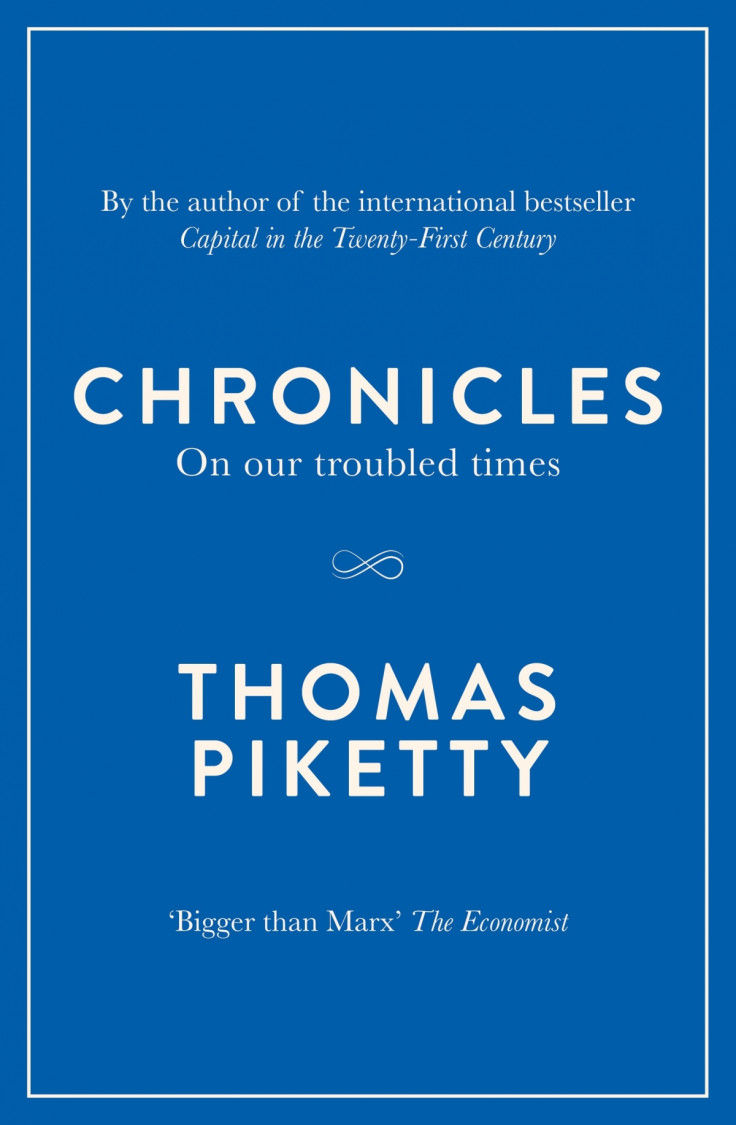Thomas Piketty's 'Chronicles: On Our Troubled Times' highlights criticisms of the EU and its ineffectual institutions

Thomas Piketty is the economist of the moment. The Frenchman became famous with his first book, Capital in the Twenty-First Century. Based upon a formidable statistical exercise using data culled from lengthy historical periods, the conclusion Piketty drew was that within major developed economies, returns from capital were growing at a faster rate than the economies themselves. This implied increasing inequality between the owners of capital and labour forces, which Piketty believes will ultimately lead to social instability.
There are, of course, problems with this analysis. In Capital, Piketty acknowledged that huge rises in income inequality do not feature in all wealthy economies. And in the US, he accepts that the main factor in growing inequality has been the ballooning salaries of the highest-paid employees, rather than rising returns from capital.
A more basic point is that capital and labour are not distinct. Most adults in Britain are in the labour force, but many are also homeowners with substantial stakes in pension funds - meaning that what is good for capital can be good for labour too. Moreover, if Piketty's broad analysis does hold water then the situation is not disastrous. Economics and politics are inextricable, and politicians can often correct adverse economic trends.

Often, but not always – and sometimes later rather than sooner. Which brings us to Piketty's new book, Chronicles: On Our Troubled Times. It is a collection of his columns for the leftist newspaper Libération during the financial crisis and its aftermath, running up to the end of 2015. The overriding theme is the future of the European Union and while the author believes passionately that the EU should endure, his analyses of the Eurozone crisis are worrying.
The fundamental problem with the Eurozone is that some members, notably Germany, run massive trade surpluses, while others, mostly to the south, run large deficits – indeed many southern European countries have big deficits with Germany itself. Historically, such imbalances were corrected by changes in currency exchange rates, but the advent of the Euro has closed this escape valve. Several countries – including, most notoriously, Greece – accumulate trade debts on an ongoing basis.
There are other factors boosting national debts, but the trade divergences are open wounds, incurable without closer financial, and hence political, integration between Eurozone members. Piketty makes this point repeatedly: "A single currency with seventeen different public [ie national] debts cannot work."
The repayment terms in Greece's last debt restructuring package can never be honoured and Piketty derides expectations otherwise as "absurd".
His solution is the mutualisation of national debts, whereby richer countries take over some of the poorer countries' debts and thus avoiding the need for periodic debt restructuring. But the transfer of funds from wealthier to poorer countries would be substantial, probably more substantial than through the give and take of negotiated debt restructurings. The risk of this damaging the more solvent economies means it has been rejected, both by Angela Merkel and the IMF.
Piketty is very critical of the cynicism of the French and German governments. The political and financial cost of the bailouts so far, particularly for Germany, are substantially outweighed by the financial benefits of its continuing trade surpluses.
More than once, Piketty describes this as "short-sighted selfishness". He insists that reform of EU institutions is necessary. In particular he is scathing about the European Council of heads of state taking key financial decisions in private. However, it is hard to see how his solution of giving the whip-hand to a parliamentary body drawn from domestic parliamentary finance committees would work for the collective good, given entrenched national interests. Besides, there is no prospect of any such reform.
Meanwhile Piketty bemoans the time and energy wasted on wrangling to no good effect. "At best, " he says, "Europe will have wasted a decade bickering and not investing in the future."
Not a good verdict then; if the Eurozone crisis is the best case study on the efficacy of the EU the conclusion must be negative – though Piketty himself remains irrepressibly optimistic. "Europe's social model is the best in the world," he says. "We need to take a giant step forward towards political union and a United States of Europe."
Away from the EU, what of Piketty's economic credo, that inequality is growing and should be tackled? If his overall thesis remains contentious there is no doubt that the rise of the super-rich is a widespread concern. Piketty advocates wealth taxes. They have now appeared in France, Italy and Spain, but with limitations. In France and Italy they are heavily tied to property, because more portable assets are not so easy to identify and tax. In Chronicles Piketty points out, more generally, that wealth taxes can only work with cooperation between major countries.
Unfortunately, the stark reality is that the challenges to such global integration are just as great, if not greater, than those posed by the Euro. Nevertheless, we must applaud Piketty's spirited idealism.
Thomas Piketty's first book, Capital in the Twenty-First Century, became a bestseller. Piketty believes inequality between capital and labour is growing. His new book is a collection of his columns for the French left-leaning newspaper Libération. The main theme is the European Union. Piketty acknowledges that trade divergences between EU members is an incurable wound without closer integration. But his solution of the mutualisation of national debts has been rejected. Piketty is critical of the French and German governments, and the time wasted on wrangling. In sum, the Eurozone crisis casts the EU in a negative light, though Piketty remains optimistic.
© Copyright IBTimes 2025. All rights reserved.





















